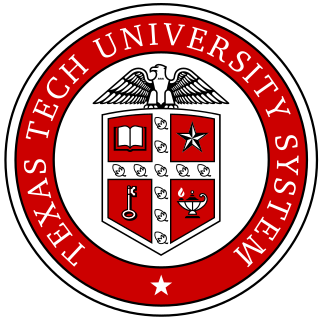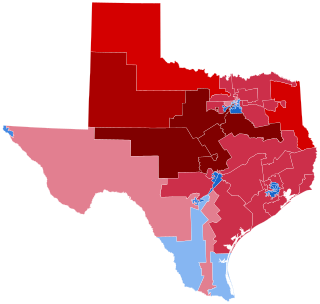
Texas Tech University is a public research university in Lubbock, Texas, United States. Established on February 10, 1923, and called Texas Technological College until 1969, it is the flagship institution of the five-institution Texas Tech University System. As of fall 2024, the university enrolled 40,969 students, making it the sixth-largest university in Texas. Over 25% of its undergraduate student population identifies as Hispanic, so the university has been designated a Hispanic-serving institution (HSI).

Kent Ronald Hance is an American politician and lawyer who is the former Chancellor of the Texas Tech University System. In his role, he oversaw Texas Tech University, Texas Tech University Health Sciences Center and Angelo State University in San Angelo, Texas. He is also a lobbyist and lawyer. Hance is the only person to defeat future President George W. Bush and became a Democratic member of the United States House of Representatives from West Texas, having served from 1979 to 1985. After his congressional service, he switched to the Republican Party and in both 1986 and 1990 ran for governor of Texas, losing in the primary election.

Robert Randolph Neugebauer is an American politician who was the U.S. representative for Texas's 19th congressional district, having served from a special election in 2003 to 2017. He is a member of the Republican Party. The district includes a large swath of West Texas, including Lubbock and Abilene. According to a 2011 survey by the National Journal, Neugebauer was "the most conservative" member of the House.

Kevin Patrick Brady is an American politician who served as the U.S. representative for Texas's 8th congressional district from 1997 to 2023. He is a member of the Republican Party. The district includes northern Houston, including The Woodlands. He retired after the 2022 election cycle.

Michael Thomas McCaul Sr. is an American attorney, politician and a member of the U.S. House of Representatives for Texas's 10th congressional district. A member of the Republican Party, he chaired the House Committee on Homeland Security during the 113th, 114th, and 115th Congresses. His district stretches from Austin to Houston.

Kenneth Michael Conaway is an American politician who was the U.S. representative for Texas's 11th congressional district from 2005 to 2021. He is a member of the Republican Party. The district Conaway represented is located in West Texas and includes Midland, Odessa, San Angelo, Brownwood, and Granbury. Conaway led the investigation into Russian interference in the 2016 United States elections after the Intelligence Committee chair, Devin Nunes, recused himself. Aside from serving as the chair of the House Ethics Committee, he served as the chair of the House Agriculture Committee, and later its ranking member. Conaway indicated in July 2019 that he would not be seeking reelection. Conaway was succeeded by fellow Republican August Pfluger.

KTXT-FM is a non-commercial educational college radio station licensed to Texas Tech University in Lubbock, Texas, United States. KTXT-FM is licensed to broadcast 35,000 watts of power to Lubbock and the surrounding South Plains of West Texas.

Texas's 19th congressional district of the United States House of Representatives includes the upper midwestern portion of the state of Texas. The district includes portions of the State from Lubbock to Abilene. The current Representative from the 19th district is Republican Jodey Arrington. With a Cook Partisan Voting Index rating of R+26, it is one of the most Republican districts in Texas.

Clay Johnson III is an American civil servant who served as the deputy director for management at the Office of Management and Budget from 2003 to the end of the George W. Bush Administration in 2009.

The Texas Tech University System is a public university system in Texas with five member universities. Headquartered in Lubbock, Texas, the Texas Tech University System is a $3 billion enterprise focused on advancing higher education, health care, research, and outreach with approximately 21,000 employees, more than 63,000 students, nearly 400,000 alumni and an endowment valued at $3.06 billion. In its short history, the TTU System has grown tremendously with 24 academic locations statewide and internationally.
The Republican Party of Texas (RPT) is the affiliate of the United States Republican Party in the state of Texas. It is currently chaired by Abraham George, succeeding Matt Rinaldi who finished his term in 2024. The party is headquartered in Austin, and is legally considered to be a political action committee. It is currently the state's ruling party, controlling the majority of Texas's U.S. House seats, both U.S. Senate seats, both houses of the state legislature, and all statewide elected offices.

John Rice Carter is the U.S. representative serving Texas's 31st congressional district since 2003. He is a Republican. The district includes the northern suburbs of Austin, as well as Fort Cavazos.
Glen Charles Robertson is an American politician who served two terms as mayor of Lubbock, from May 19, 2012 until May 17, 2016.

The 2016 United States House of Representatives elections in Texas were held on November 8, 2016, to elect the 36 U.S. representatives from the state of Texas, one from each of the state's 36 congressional districts. The elections coincided with the 2016 presidential election, as well as other elections to the House of Representatives, elections to the United States Senate and various state and local elections. The primaries were held on March 1.

James Wesley Hendrix is a United States district judge of the United States District Court for the Northern District of Texas and former assistant United States attorney for the same district. He presides over the Northern District's Lubbock, Abilene, and San Angelo Divisions, which account for 47 of the Northern District's 100 counties, and span an area larger than Pennsylvania.

John Williams Rose is an American politician and businessman serving as the U.S. representative for Tennessee's 6th congressional district since 2019. A Republican, he was commissioner of agriculture for Tennessee and president of Boson Software, LLC.
Tedd L. Mitchell is an American academic. He is the fifth chancellor of the Texas Tech University System. He is also the chairman for the Board of Trustees of the Cooper Institute, a Dallas-based health and wellness system founded by Kenneth H. Cooper.

The 2022 United States House of Representatives elections in Texas were held on November 8, 2022, to elect the 38 U.S. representatives from Texas, one from each of the state's 38 congressional districts. The state gained two seats after the results of the 2020 census. The elections coincided with other elections to the House of Representatives, other elections to the United States Senate, and various state and local elections. Primary elections took place on March 1, with primary runoffs scheduled for May 24 for districts where no candidate received over 50% of the vote.

The 2021 Texas's 6th congressional district special election was held on May 1, 2021. The seat became vacant after incumbent Republican Ron Wright died on February 7 of COVID-19.
















